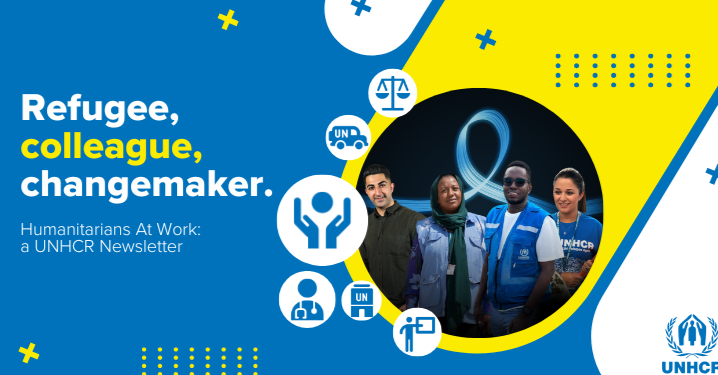By UNHCR, the UN Refugee Agency
This World Refugee Day, we’re turning the spotlight on some of our own. These are UNHCR, the UN Refugee Agency colleagues who are or were once refugees themselves.
Their journeys span continents, crises and chapters of resilience. Today, they bring lived experience to our mission. In their own words, they reflect on what it means to be displaced, how to make sense of it, and finally, on the power of solidarity.
Welcome to a special edition of Humanitarians At Work, UNHCR’s newsletter spotlighting what it’s like to be a humanitarian working with forcibly displaced and stateless people. This year, World Refugee Day comes at a time when 1 in every 67 people on the planet is forcibly displaced. Among them are 42.7 million refugees. But behind the grim numbers are real people whose lives have been upended by war, violence and persecution.
Graphic with the question: ‘What does it mean to be forced to flee your home and to now work for UNHCR?’ — accompanied by blue and yellow question mark icons.
To be forced to flee is to lose not just a home, but pieces of yourself. For some, it’s the last glimpse of a beloved skyline. For others, it’s saying goodbye to a career, a community or childhood toys left behind.
Hanifa Karimi remembers watching her father leave behind a life he spent 30 years building, suitcase in hand. She fled twice, once from Afghanistan, again from Ukraine, and knows too well what it means to start over again and again. For her, working at UNHCR is not just a job; it’s a continuation of her family’s story of resilience, and a way to offer others the solidarity that once sustained her.
For Ilyas AG MALICK, who fled Mali to Burkina Faso as a child, displacement was a painful rupture. “It meant leaving everything behind overnight: home, family, identity,” he recalls. “But it also opened an unexpected path. Working at UNHCR today is more than a job, it’s a life mission. It’s a way to give hope to others living the reality I once knew. It’s recognition that drives me to serve with empathy, respect and professionalism.”
Rehab Khalifa adds another powerful dimension: “This experience has reshaped everything I thought I understood. It’s deepened my empathy, sharpened my purpose and reminded me that humanity isn’t defined by borders, but by how we care for one another in times of crisis.”
She now speaks not only as a professional but as someone navigating legal systems, worrying for her children’s future and carrying the quiet strength so many refugees bear. “I live the life I once only witnessed from the other side of the desk,” she says. “Being a refugee is not an identity. It is a circumstance. And it can happen to anyone.”
For others, like VICTORIA SHABAN, flight came while already serving others in crisis. When the war reached her doorsteps in Ukraine, she moved from response work in Azerbaijan to Moldova, the Czech Republic and eventually back to Ukraine, this time not only as a humanitarian, but as someone whose own life had been uprooted.









